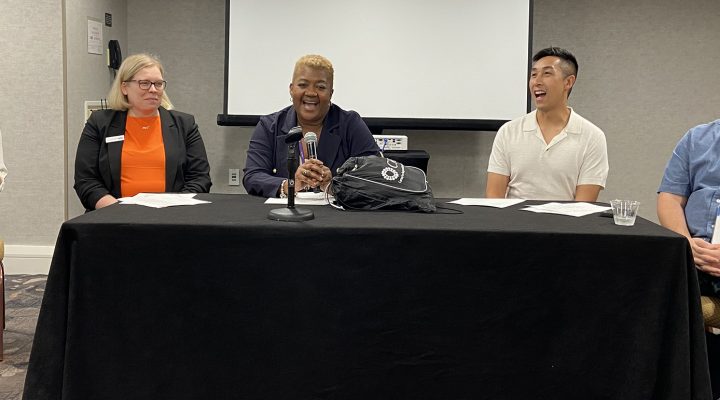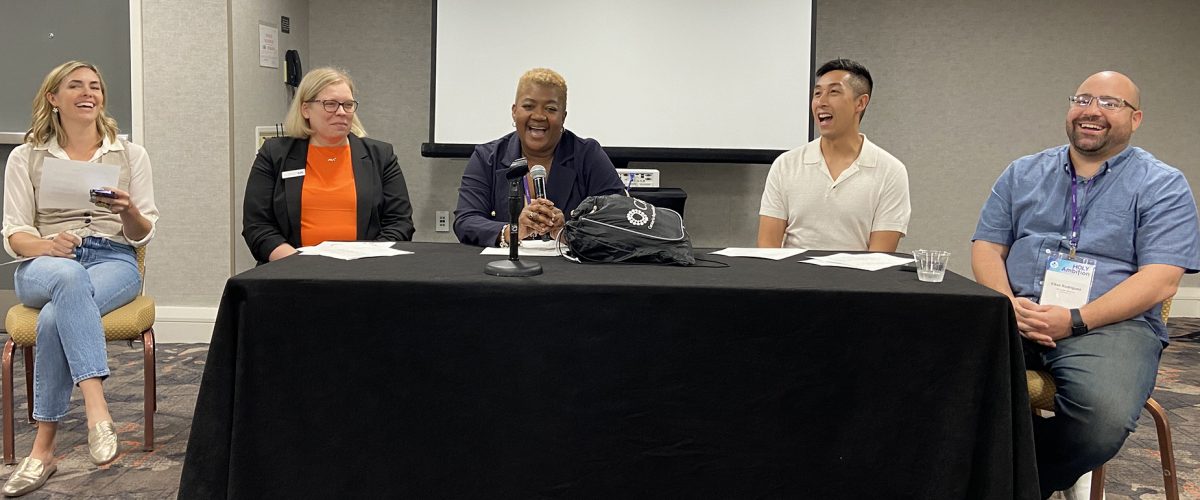The range of advocacy is as varied as the people who need others to speak on their behalf, but it is grounded in a sense of calling, a panel of advocates said during the Cooperative Baptist Fellowship’s General Assembly in Atlanta June 29.
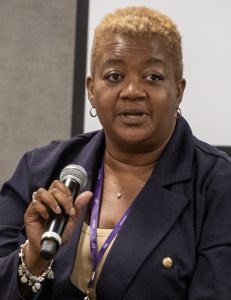
Tamika McGhee
Jennifer Hawks, associate general counsel for Baptist Joint Committee on Religious Liberty; Tamika McGhee, faith outreach and policy manager for the Center for Responsible Lending; Kevin Pranoto, associate pastor of social work at Second Baptist Church in Little Rock, Ark.; and Elket Rodríguez, CBF missionary in the Rio Grande Valley, addressed “Advocacy in Practice” in a CBF learning labs breakout session.
Moderator Cameron Mason Vickrey, communications and development director for Fellowship Southwest, asked panelists to describe the range of advocacy implemented by their organizations.
BJC engages in advocacy both through education and mobilization of Baptists to act on behalf of religious liberty for all people, Hawks said, noting potential advocates often think advocacy is outside their comfort zones or beyond their capabilities. “We tell them, ‘If you can have a conversation, you can be an advocate,’” she reported.
“It is a Christian responsibility to speak up for people whose voices might not be heard.”
The Center for Responsible Lending works with faith leaders to provide relief for “consumers in trouble with a cycle of debt,” McGhee said. Believers “from every faith tradition, conservative and liberal, know payday lending is wrong.”
“Advocacy looks like a variety of things,” Pranoto added. “It’s going to the state capitol and talking to elected representatives. It’s a letter-writing campaign for Bread for the World. It’s a Sunday worship service on food insecurity, and it’s education, like a six-week course on diversity.”
“Advocacy looks very different every week,” said Rodríguez, an attorney and immigration policy expert. “On the (U.S.-Mexico) border, it’s talking with immigration officials and partners about migrant situations and ports of entry. Nationally, it’s talking about immigration reform and strategizing with coalition partners. Globally, it’s educating pastors and churches from Mexico to Argentina on migrant trends and U.S. policies.”
But whatever the issue and however diverse the approach, the panelists connected advocacy to their faith.
“It is a Christian responsibility to speak up for people whose voices might not be heard,” Pranoto said, noting he learned advocacy is a core value of a social worker while studying at the Diana Garland School of Social Work at Baylor University. “We who have power must exercise it on behalf of others.”
Seen proactively, advocacy is best presented “not as what we are against so much as responding to what we are for,” he added. “We’re not always against others whose positions we oppose, but we build relationships to create a culture of mutual support.”
Advocating from a foundation of faith often involves convincing other believers advocacy is positive and appropriate, McGhee stressed.
“A lot of older church members thought they shouldn’t be doing advocacy. But we showed them from Scripture how usury is wrong.”
“We receive calls from churches and faith groups about advocacy,” she said. “A lot of older church members thought they shouldn’t be doing advocacy. But we showed them from Scripture how usury is wrong. So, I enjoy going out and educating — convincing pastors to stand up for people in their communities.”
Hawks recalled her original experience in advocacy related to congregations was negative. When she was a law student at the University of Mississippi, she was part of a team that tried to get a state law passed to protect children.
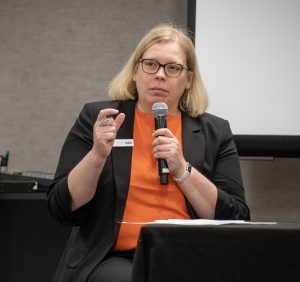
Jennifer Hawks
“We approached a lot of churches to support our bill, and they said, ‘That’s not what we do,’” she said. Later, while attending Baylor University’s Truett Theological Seminary, she met Suzii Paynter, then executive director of the Texas Baptist Christian Life Commission and later executive coordinator of CBF. Paynter talked extensively about the connection between faith and public policy in what became a “transformative experience,” Hawks remembered.
Like many ventures, advocacy is not an always-successful undertaking, Vickrey noted. Sometimes, the results are sources of pride. Other times, events go terribly wrong. The panelists agreed.
The Center for Responsible Lending joined other groups in advocating for creating the Consumer Financial Protection Bureau, a federal agency responsible for protecting people from unfair financial practices.
“We fought hard for CFPB to exist. It has helped a lot of people — working for their right to stay independent,” McGhee said. “But CFPB is in jeopardy (from political conservatives). This is gut-wrenching.”
The center also has advocated to obtain stricter regulations on payday lending and “got nothing we asked for,” she added. “Payday lending is still keeping people in a cycle of debt. We were all hurt.”
Pranoto cited frustration when government agencies want faith groups to “just jump on board” worthy causes without thorough planning and preparation.
But on the other hand, Second Baptist in Little Rock recently collaborated with Bread for the World in an advocacy campaign on behalf of hungry people. “Our church learned a lot about letter-writing, … and we placed our letters on the altar as an offering to God,” he said. “People grasped how simple advocacy can be.”
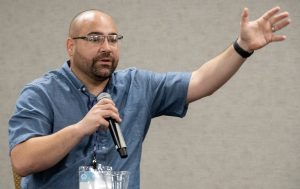
Elket Rodriguez
Rodríguez recalled when a group of pastors from Fellowship Southwest’s immigrant relief coalition met with a government immigration official. At the time, the U.S. government’s “remain in Mexico” policy required migrants seeking U.S. asylum to stay in Northern Mexico while their asylum applications were being processed. This left them “captive” to the whims of Mexican cartels, which dominate the region.
“The migrants were living in camps in tents — hundreds of families, thousands of people — in squalid conditions,” Rodríguez said. “We met with the government official for one and a half hours. We did not talk much, while this politician told us how migrants bring sickness and chaos into the community. We reached no agreements.”
But advocacy succeeded when a U.S. official agreed to ensure that a grandmother and granddaughter could cross the border together, so the grandmother could accompany the girl while she received desperately needed medical treatment, he said.
“Sometimes, a small win is still a win.”
“Sometimes, a small win is still a win,” Hawks said. She recalled being able to set up a congressional meeting that involved BJC representatives and non-Baptist, non-Christian and nonreligious participants. The diversity of that delegation impressed the congressional representatives. “Coalitions … make a difference,” she said.
Christians from all places with all kinds of backgrounds can be effective advocates, the panelists said.
“Let your community’s needs inform what you choose to be your advocacy issues,” Rodríguez urged.
“Don’t let perfect be the enemy of the good,” Hawks added. “Connect with other organizations that share your concern and can help you. And find groups you can trust for their resources.”
Related articles:
Practicing advocacy from the pulpit can be a ‘fiery furnace’ experience, panelists tell CBF
Advocacy’s power flows from grassroots movements, Tyler and Henderson tell CBF

